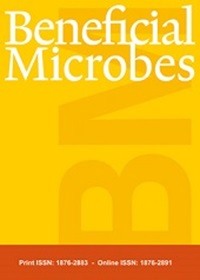Short-chain fatty acids inhibit the activation of T lymphocytes and myeloid cells and induce innate immune tolerance
IF 3
4区 医学
Q2 MICROBIOLOGY
引用次数: 0
Abstract
Abstract The intestinal microbiota contributes to gut immune homeostasis, where short-chain fatty acids (SCFAs) function as the major mediators. We aimed to elucidate the immunomodulatory effects of acetate, propionate, and butyrate. With that in mind, we sought to characterise the expression of SCFA receptors and transporters as well as SCFAs’ impact on the activation of different immune cells. Whereas all three SCFAs decreased tumour necrosis factor (TNF)-α production in activated T cells, only butyrate and propionate inhibited interferon (IFN)-γ, interleukin (IL)-17, IL-13, and IL-10 production. Butyrate and propionate inhibited the expression of the chemokine receptors CCR9 and CCR10 in activated T- and B-cells, respectively. Similarly, butyrate and propionate were effective inhibitors of IL-1β, IL-6, TNF-α, and IL-10 production in myeloid cells upon lipopolysaccharide and R848 stimulation. Acetate was less efficient at inhibiting cytokine production except for IFN-α. Moreover, SCFAs inhibited the production of IL-6 and TNF-α in monocytes, myeloid dendritic cells (mDC), and plasmacytoid dendritic cells (pDC), whereas acetate effects were relatively more prominent in pDCs. In monocytes and mDCs, acetate was a less efficient inhibitor, but it was equally effective in inhibiting pDCs activation. We also studied the ability of SCFAs to induce trained immunity or tolerance. Butyrate and propionate – but not acetate – prevented Toll-like receptor-mediated activation in SCFA-trained cells, as demonstrated by a reduced production of IL-6 and TNF-α. Our findings indicate that butyrate and propionate are equally efficient in inhibiting the adaptive and innate immune response and did not induce trained immunity. The findings may be explained by differential SCFA receptor and transporter expression profiles of the immune cells.短链脂肪酸抑制T淋巴细胞和骨髓细胞的活化,诱导先天免疫耐受
肠道微生物群参与肠道免疫稳态,其中短链脂肪酸(SCFAs)是主要的介质。我们的目的是阐明乙酸酯、丙酸酯和丁酸酯的免疫调节作用。考虑到这一点,我们试图表征SCFA受体和转运体的表达,以及SCFA对不同免疫细胞激活的影响。虽然所有三种scfa都能降低活化T细胞中肿瘤坏死因子(TNF)-α的产生,但只有丁酸盐和丙酸盐能抑制干扰素(IFN)-γ、白细胞介素(IL)-17、IL-13和IL-10的产生。丁酸盐和丙酸盐分别抑制T细胞和b细胞趋化因子受体CCR9和CCR10的表达。同样,在脂多糖和R848刺激下,丁酸盐和丙酸盐是髓细胞IL-1β、IL-6、TNF-α和IL-10产生的有效抑制剂。除IFN-α外,乙酸对细胞因子产生的抑制效果较差。此外,SCFAs抑制单核细胞、髓样树突状细胞(mDC)和浆细胞样树突状细胞(pDC)中IL-6和TNF-α的产生,而乙酸对pDC的影响相对更明显。在单核细胞和mDCs中,醋酸酯是一种效率较低的抑制剂,但在抑制pDCs激活方面同样有效。我们还研究了SCFAs诱导训练免疫或耐受的能力。丁酸盐和丙酸盐(而不是醋酸盐)可以阻止scfa训练细胞中toll样受体介导的激活,这可以通过减少IL-6和TNF-α的产生来证明。我们的研究结果表明,丁酸盐和丙酸盐在抑制适应性和先天免疫反应方面同样有效,并且不会诱导训练免疫。这些发现可能是由免疫细胞的不同SCFA受体和转运蛋白表达谱来解释的。
本文章由计算机程序翻译,如有差异,请以英文原文为准。
求助全文
约1分钟内获得全文
求助全文
来源期刊

Beneficial microbes
MICROBIOLOGY-NUTRITION & DIETETICS
CiteScore
7.90
自引率
1.90%
发文量
53
审稿时长
>12 weeks
期刊介绍:
Beneficial Microbes is a peer-reviewed scientific journal with a specific area of focus: the promotion of the science of microbes beneficial to the health and wellbeing of man and animal. The journal contains original research papers and critical reviews in all areas dealing with beneficial microbes in both the small and large intestine, together with opinions, a calendar of forthcoming beneficial microbes-related events and book reviews. The journal takes a multidisciplinary approach and focuses on a broad spectrum of issues, including safety aspects of pro- & prebiotics, regulatory aspects, mechanisms of action, health benefits for the host, optimal production processes, screening methods, (meta)genomics, proteomics and metabolomics, host and bacterial physiology, application, and role in health and disease in man and animal. Beneficial Microbes is intended to serve the needs of researchers and professionals from the scientific community and industry, as well as those of policy makers and regulators.
The journal will have five major sections:
* Food, nutrition and health
* Animal nutrition
* Processing and application
* Regulatory & safety aspects
* Medical & health applications
In these sections, topics dealt with by Beneficial Microbes include:
* Worldwide safety and regulatory issues
* Human and animal nutrition and health effects
* Latest discoveries in mechanistic studies and screening methods to unravel mode of action
* Host physiology related to allergy, inflammation, obesity, etc.
* Trends in application of (meta)genomics, proteomics and metabolomics
* New developments in how processing optimizes pro- & prebiotics for application
* Bacterial physiology related to health benefits
 求助内容:
求助内容: 应助结果提醒方式:
应助结果提醒方式:


